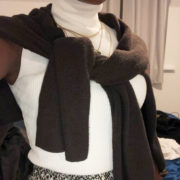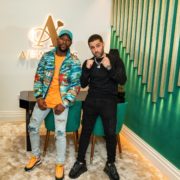Masks In UK Music: The Impact Of The Allure [by @ogun_official]
![Masks In UK Music: The Impact Of The Allure [by @ogun_official]](https://guap.co.uk/wp-content/uploads/2020/04/MASKS-IN-UK-MUSIC-180x180.jpg)
There is something fundamentally intriguing, even attractive about mystery. Although it doesn’t seem like it in contemporary society, mystery has been an integral part of entertainment culture and the arts for a remarkable amount of time. Simply put, there is an innate allure to masks because of their mysterious nature. They are an important item in keeping a mystique alive. Historically speaking, masks have played an integral role in both Ancient Greece and Ancient Rome. So it should not come as a surprise in the present-day that many artists choose to keep this tradition alive.
There seems to be a common impulse to retain as much anonymity as possible in a society where everything and everyone is so heavily conspicuous. And what better way to do this than to hide behind a mask?

When we apply this general desire for anonymity to the music industry, we can begin to understand the value of a mask to musicians. Music, more than any other art form, has become incredibly transparent. We hear musicians, we see them thanks to music videos and social media. Ultimately, we assume that we know them for a variety of reasons; the content of their music, interviews, the public appearances that they make and platforms such as Twitter or tabloid-style Instagram accounts such as The Shade Borough and The Shade Room who disseminate information about artists. This seems to be a major issue in the music industry. Some artists might use this to their advantage. Figures such as 6ix9ine come to mind, who have used these platforms to ‘troll’ and garner attention. For others though, this is a major annoyance and a violation of their privacy.
The intrusion of privacy can become problematic for certain artists. To use Drill artists as an example, the genre itself can be argued to be somewhat of a violent genre and those who participate in its culture are susceptible to serious consequences at any given time. Recently, popular upcoming rapper SJ from OFB was given a life sentence. In a more harrowing example, Teewizz is unfortunately just one of many drill artists to have been killed due to music and gang feuds.
What this illustrates is that these artists have to worry about retribution from ‘opps’ but also being reprimanded by the police as well. Furthermore, there have been multiple instances when Drill songs have been used in court against suspects. Drill group 1011 for example, were banned from making music and their songs were used as proof of criminal activity in court. In order to avoid persistent legal trouble, anonymity equips Drill artists with creative freedom because the possibility of being reprimanded becomes greatly reduced. Therefore, a certain level of anonymity is not only desirable but also beneficial.
Drill artists are not the only people that have used masks in the UK’s music industry, in fact, they have been used throughout time in wider genres. CASISDEAD has been using a mask since 2012, causing fans to speculate and make theories about the man behind the mask, leading to entire Reddit threads trying to decipher his identity. Masks have also had some popularity within the electronic music genre with artists such as SBTRKT choosing to obscure their identity by wearing a mask as well.
Nevertheless, there is no denying that Drill has led to an exponential growth in the use of masks and balaclavas. On a practical level these masks protect the identity of artists from potential danger and also from legal conflictions. Additionally, in the increasingly surveilled society that we are now living in, wearing a mask provides some form of protection against unwanted intrusions.
In some cases, masks have become an aesthetic commodity and for a plethora of artists, an integral aspect of their overall brand. From LD’s iconic silhouette, reminiscent of the classic MF Doom mask; to Woosh’s light-up mask (taken from The Purge franchise) and even V9’s instantly recognisable Deadpool mask. Each of these rappers’ masks are an extremely important aspect of their overall image. What’s also interesting here is the intersection of popular culture with urban, working-class culture. Films such as The Purge and Deadpool have become a part of the mainstream canon and these artists have found a unique and interesting way of appropriating and engaging with this canon.
It is also worth noting that these masks can ensure that an act’s artistry and their reality are neatly separated. The power of the mask means that it can become a symbol of a certain persona. M Huncho serves as the quintessential example of this. M Huncho, who isn’t a Drill rapper but still dons a mask, has reiterated numerous times that he wears his mask because he enjoys his privacy in his ‘regular’ life. ‘I wear this mask for privacy. I like living a calm life. I keep a tight knit circle and I like to keep it that way bro. I would like to get married, have kids. I can’t be having fans coming up to me every second asking for a picture when I am with my wife and kids,’ he told GRM . He emphasises a desire to juxtapose normalcy amidst the madness of fame. This desire for privacy appears to be considerable and has been expressed by numerous celebrities from a range of creative disciplines. Masks in this context give the artists the opportunity to be superstars and ‘regular’ people simultaneously.
Arguably, wearing a mask can mean that the focus remains primarily on music since the fans avoid being caught up on physical appearances or other superficialities. In his NPR article, journalist Andrew Matson notes the shock that audience members had when they realised that SBTRKT ‘wasn’t black’. This illustrates that someone’s physicalities can potentially distract consumers from the actual music. Freelance writer Rudie Obias unpacks this topic further. ‘if you’re the type of artist that cares more about the art than the money and fame, then hiding your identity is the best way to keep your audience’s attention on the art rather than the superficial’.
Ultimately, there is a certain level of freedom that privacy or anonymity grants you, a freedom that is otherwise simply unattainable. The actions or things that people say behind a mask are less consequential that anyone else because their real identities are obscured. Revisiting MF Doom, the lyricist has been repeatedly accused of sending imposters to his shows instead of performing himself . Doom has managed to justify sending imposters to shows as being something consumers should expect from the character that he has created. In contrast, primary school teacher Christian Webb was fired not long after his employers found out that he had a rap alter-ego called MC Devvo and was rapping about illicit activities and inappropriately touching girls. The privilege of Doom’s anonymity has allowed him to get away with behaviour that would instantly be reproached if he wasn’t wearing the mask. Webb’s behaviour cost him his job as soon as his identity was unravelled. Anonymity is a privilege in the modern-day.
On the other hand though, wearing a mask is not always beneficial. Sometimes, it can cause a heightened fixation on the superficialities of being an artist, especially when it comes to the artist’s image. With M Huncho, a look at the comments on any of his music videos will show countless comments trying to figure out what his ethnicity is. Instead of focusing on the music, audiences in some cases become fixated with the character, the person behind the lyrics. Furthermore, there may be a ceiling for artists who wear a mask. There is a level of celebrity or stardom that may be unattainable if one disguises themself. For artists who want to ‘cross-over’ from Drill into more mainstream genres, or artists who would like to be able to access certain spaces such as award shows and the like, the mask can become a problem.

Artists such as Russ have unmasked and have gone on to achieve great feats such as reaching number one in the charts with the song ‘Keisha & Becky’. K-Trap himself, after unmasking, noted that when he first wore the mask, he never considered taking it off. However when it was time to progress his career, he realised that he had to abandon his mask-led persona. Entertainers Q2T and S1 for instance, have been critiqued by fans following their respective unmasking’s. ‘No Fibs,’ an early Q2T single for example, includes multiple lyrics revealing regret in the permanent removal of his Bally. On top of this, there is an entire video dedicated to Drill rappers that have unmasked and comments double down on the critique of the aforementioned rappers for this decision.
Masks have become a staple in the UK urban music scene. Whether you look at it as a necessity for the artist, or as a fashionable commodity, or somewhere perhaps in-between, there is no questioning the importance of masks today. The allure of masks has arguably never been higher. Not only for the consumer who is attracted to the mystery but also the artist for their own reasons. Looking into the future, as society becomes increasingly surveillance-based, and social media becomes more ubiquitous, masks may become a new norm. In the classic Jim Carrey movie, The Mask, he says that ‘we all wear masks, metaphorically speaking’. Maybe it’s time to get a real mask too.
Words: Andrew Ogun

